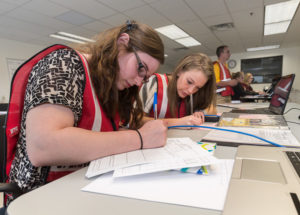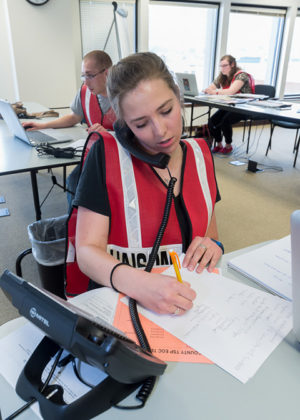Penn College Emergency Management Interns Help Communities
Thursday, November 2, 2017
Twelve students enrolled in emergency management technology at Pennsylvania College of Technology recently applied their skills during rewarding internships in Pennsylvania and New York.
The internships supplement the hands-on education the students receive in the classroom and at community-based training exercises.
 The students and their assignments were: Cory Crider, of Blackwood, New Jersey, and Charles E. O’Brien Jr., of South Williamsport, both serving with the City of Williamsport’s Emergency Management Office; Gaven D. Crosby, of Benton, with the Army National Guard Homeland Response Force; Autumn M. Devine, of Mars, with Emergency Disaster Services, American Red Cross of Western Pennsylvania Region; Madison H. Januchowski, of Montoursville, with Erie County (New York) Emergency Management Civil Defense/Homeland Security Division; and Elizabeth L. Landis, of Columbia, Emergency Management Office, Penn State Health Milton S. Hershey Medical Center.
The students and their assignments were: Cory Crider, of Blackwood, New Jersey, and Charles E. O’Brien Jr., of South Williamsport, both serving with the City of Williamsport’s Emergency Management Office; Gaven D. Crosby, of Benton, with the Army National Guard Homeland Response Force; Autumn M. Devine, of Mars, with Emergency Disaster Services, American Red Cross of Western Pennsylvania Region; Madison H. Januchowski, of Montoursville, with Erie County (New York) Emergency Management Civil Defense/Homeland Security Division; and Elizabeth L. Landis, of Columbia, Emergency Management Office, Penn State Health Milton S. Hershey Medical Center.
Also: Grant A. McCauley, of Muncy, with Clinton County Department of Emergency Services; Brittany L. Neupauer, of Williamsport, with Lonza Inc., Williamsport; Katie R. Pierce, of Endicott, New York, with Broome County (New York) Office of Emergency Services; Brandon A. Schrimp, of Williamsport, with UPMC Susquehanna, Williamsport; Steven J. Moon, of Williamsport, with Union County Emergency Management Agency; and Madeline P. Wenk, of Biglerville, with Cumberland County Emergency Management Agency.
“I got involved in emergency management because I see it as the best way that I can help my community,” Devine said.
Devine’s internship with the American Red Cross of Western Pennsylvania Region engaged her in emergency preparedness planning, as well as responding to two real-life emergencies – setting up a shelter following a seven-alarm apartment building fire, and performing damage assessments and distributing cleanup kits after flooding. The Penn College student also participated in a home smoke-detector education and installation campaign.
“I think the most rewarding part of my internship was seeing how dedicated all the Red Cross volunteers are to helping people in need,” she added.
 Landis’ internship at Penn State Health Milton S. Hershey Medical Center permitted her to develop a hospital evacuation plan as part of existing emergency operations plans.
Landis’ internship at Penn State Health Milton S. Hershey Medical Center permitted her to develop a hospital evacuation plan as part of existing emergency operations plans.
“This was a project that allowed me to lead and experience the entire planning process,” Landis said. “I formed planning teams, gained valuable information and situation awareness, developed the plan, and coordinated plan evaluation.”
The Penn College student says she was introduced to the realm of first responders while attending high school at Lancaster County Career and Technology Center.
“I fell in love with the entire concept of helping people and making a difference,” Landis said. “My career goals are in health care preparedness or local level emergency management such as at a county emergency management agency. I want to provide preparedness for the community I live in. Expanding the local level of preparedness … is something I am passionate about.”
Penn College’s emergency management curriculum is designed to equip students with a comprehensive understanding and hands-on application of skills across the emergency management spectrum.
The students are trained to analyze natural, man-made, biological and technological hazards and vulnerabilities; build community partnerships that expand resources; communicate risks and safety information; handle crisis communications and psychological first aid; and recognize local, state and federal laws, regulations, policies and procedures related to emergency management efforts.
Resulting jobs include emergency management coordinators and specialists, emergency planners, and public health and health care preparedness workers.
Penn College also offers an online emergency management technology bachelor of science degree.
For more about Penn College, a national leader in applied technology education, email the Admissions Office or call toll-free 800-367-9222.
The internships supplement the hands-on education the students receive in the classroom and at community-based training exercises.
 The students and their assignments were: Cory Crider, of Blackwood, New Jersey, and Charles E. O’Brien Jr., of South Williamsport, both serving with the City of Williamsport’s Emergency Management Office; Gaven D. Crosby, of Benton, with the Army National Guard Homeland Response Force; Autumn M. Devine, of Mars, with Emergency Disaster Services, American Red Cross of Western Pennsylvania Region; Madison H. Januchowski, of Montoursville, with Erie County (New York) Emergency Management Civil Defense/Homeland Security Division; and Elizabeth L. Landis, of Columbia, Emergency Management Office, Penn State Health Milton S. Hershey Medical Center.
The students and their assignments were: Cory Crider, of Blackwood, New Jersey, and Charles E. O’Brien Jr., of South Williamsport, both serving with the City of Williamsport’s Emergency Management Office; Gaven D. Crosby, of Benton, with the Army National Guard Homeland Response Force; Autumn M. Devine, of Mars, with Emergency Disaster Services, American Red Cross of Western Pennsylvania Region; Madison H. Januchowski, of Montoursville, with Erie County (New York) Emergency Management Civil Defense/Homeland Security Division; and Elizabeth L. Landis, of Columbia, Emergency Management Office, Penn State Health Milton S. Hershey Medical Center.Also: Grant A. McCauley, of Muncy, with Clinton County Department of Emergency Services; Brittany L. Neupauer, of Williamsport, with Lonza Inc., Williamsport; Katie R. Pierce, of Endicott, New York, with Broome County (New York) Office of Emergency Services; Brandon A. Schrimp, of Williamsport, with UPMC Susquehanna, Williamsport; Steven J. Moon, of Williamsport, with Union County Emergency Management Agency; and Madeline P. Wenk, of Biglerville, with Cumberland County Emergency Management Agency.
“I got involved in emergency management because I see it as the best way that I can help my community,” Devine said.
Devine’s internship with the American Red Cross of Western Pennsylvania Region engaged her in emergency preparedness planning, as well as responding to two real-life emergencies – setting up a shelter following a seven-alarm apartment building fire, and performing damage assessments and distributing cleanup kits after flooding. The Penn College student also participated in a home smoke-detector education and installation campaign.
“I think the most rewarding part of my internship was seeing how dedicated all the Red Cross volunteers are to helping people in need,” she added.
 Landis’ internship at Penn State Health Milton S. Hershey Medical Center permitted her to develop a hospital evacuation plan as part of existing emergency operations plans.
Landis’ internship at Penn State Health Milton S. Hershey Medical Center permitted her to develop a hospital evacuation plan as part of existing emergency operations plans.“This was a project that allowed me to lead and experience the entire planning process,” Landis said. “I formed planning teams, gained valuable information and situation awareness, developed the plan, and coordinated plan evaluation.”
The Penn College student says she was introduced to the realm of first responders while attending high school at Lancaster County Career and Technology Center.
“I fell in love with the entire concept of helping people and making a difference,” Landis said. “My career goals are in health care preparedness or local level emergency management such as at a county emergency management agency. I want to provide preparedness for the community I live in. Expanding the local level of preparedness … is something I am passionate about.”
Penn College’s emergency management curriculum is designed to equip students with a comprehensive understanding and hands-on application of skills across the emergency management spectrum.
The students are trained to analyze natural, man-made, biological and technological hazards and vulnerabilities; build community partnerships that expand resources; communicate risks and safety information; handle crisis communications and psychological first aid; and recognize local, state and federal laws, regulations, policies and procedures related to emergency management efforts.
Resulting jobs include emergency management coordinators and specialists, emergency planners, and public health and health care preparedness workers.
Penn College also offers an online emergency management technology bachelor of science degree.
For more about Penn College, a national leader in applied technology education, email the Admissions Office or call toll-free 800-367-9222.